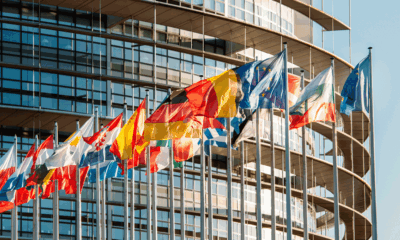Business
Nigeria and South Africa Poised to Leave FATF Gray List in October

Nigeria and South Africa are on track to be removed from the Financial Action Task Force’s (FATF) “gray list” as early as October 24, 2023. This development will mark a significant milestone for both nations, which rank among Africa’s largest economies. The FATF’s decision follows recent on-site evaluations that highlighted substantial progress in addressing issues related to illicit financial flows.
The FATF placed Nigeria and South Africa under increased scrutiny in February 2023 due to concerns over their anti-money laundering measures. According to anonymous sources familiar with the assessments, the FATF has noted that all four countries—Nigeria, South Africa, Burkina Faso, and Mozambique—have made considerable improvements in their action plans. The final decision regarding their removal from the gray list will be made during the FATF plenary meeting in Paris.
Temitope Ajayi, a spokesman for the Nigerian government, expressed optimism about the potential delisting, calling it “a culmination of the remarkable work the government is doing.” He emphasized that this change would enhance Nigeria’s attractiveness to foreign investors. Similarly, government officials from South Africa have indicated that exiting the gray list would positively influence investor sentiment.
In addition to Nigeria and South Africa, Burkina Faso and Mozambique are also expected to be delisted. Mozambique has reportedly completed the necessary 26 actions for removal, as confirmed by Luís Abel Cezerilo, the national coordinator for the country’s delisting efforts. He noted the timing is crucial, as it coincides with TotalEnergies SE potentially resuming its $20 billion natural gas export project.
Burkina Faso has also met the requirements for exit, having implemented all 37 measures mandated by the FATF. However, officials from the country’s finance ministry were unavailable for comments.
Lauren van Biljon, a senior portfolio manager at Allspring Global Investments UK Ltd., remarked that the removal from the gray list would likely boost market sentiment. Although the immediate market impact may be modest, Van Biljon indicated there could be a short-term increase in asset prices.
The FATF’s gray list designation raises concerns about the integrity of financial systems in affected jurisdictions. A report by the International Monetary Fund (IMF) in 2021 found that countries on the gray list experienced a significant decline in capital inflows. As such, the watchdog’s recommendations are closely monitored by global investors wary of conducting business in regions perceived as deficient in anti-money laundering regulations.
Under the leadership of Elisa de Anda Madrazo, the FATF has revised its gray-listing criteria, focusing more on wealthier jurisdictions while reducing emphasis on less-developed countries. This shift aims to enhance the effectiveness of global efforts to combat money laundering and terrorist financing.
As the October plenary date approaches, both Nigeria and South Africa await confirmation of their status, with potential implications for their economies and investment climates.
-

 Entertainment3 months ago
Entertainment3 months agoAnn Ming Reflects on ITV’s ‘I Fought the Law’ Drama
-

 Entertainment4 months ago
Entertainment4 months agoKate Garraway Sells £2 Million Home Amid Financial Struggles
-

 Health3 months ago
Health3 months agoKatie Price Faces New Health Concerns After Cancer Symptoms Resurface
-

 Entertainment3 months ago
Entertainment3 months agoCoronation Street’s Carl Webster Faces Trouble with New Affairs
-

 Entertainment3 months ago
Entertainment3 months agoWhere is Tinder Swindler Simon Leviev? Latest Updates Revealed
-

 World2 weeks ago
World2 weeks agoBailey Announces Heartbreaking Split from Rebecca After Reunion
-

 Entertainment2 weeks ago
Entertainment2 weeks agoCoronation Street Fans React as Todd Faces Heartbreaking Choice
-

 Entertainment4 months ago
Entertainment4 months agoMarkiplier Addresses AI Controversy During Livestream Response
-

 Science1 month ago
Science1 month agoBrian Cox Addresses Claims of Alien Probe in 3I/ATLAS Discovery
-

 Health5 months ago
Health5 months agoCarol Vorderman Reflects on Health Scare and Family Support
-

 Entertainment4 months ago
Entertainment4 months agoKim Cattrall Posts Cryptic Message After HBO’s Sequel Cancellation
-

 Entertainment3 months ago
Entertainment3 months agoOlivia Attwood Opens Up About Fallout with Former Best Friend





















